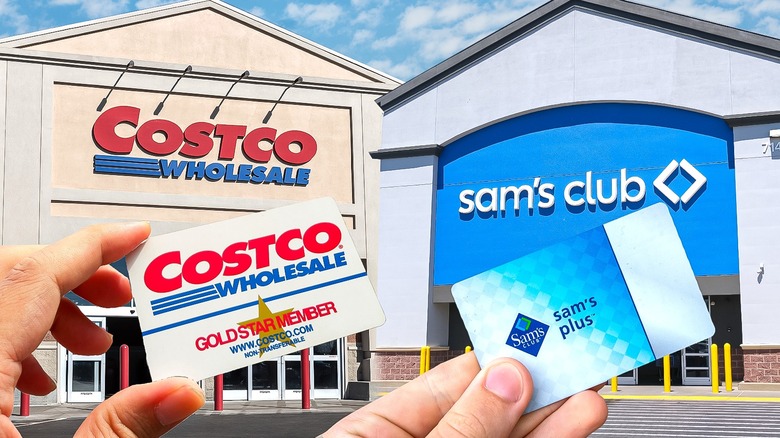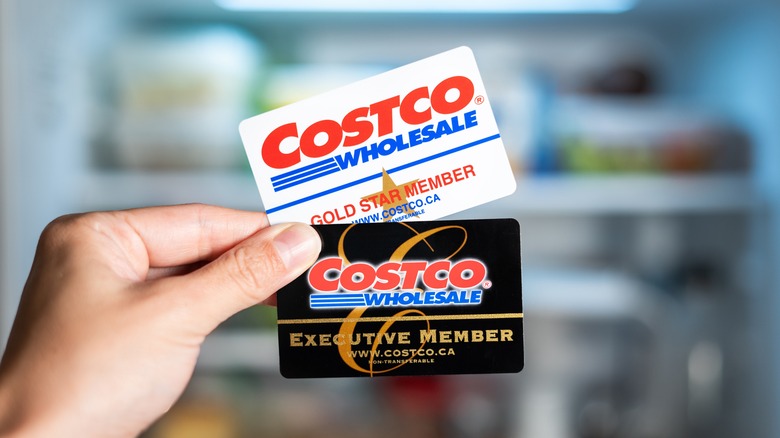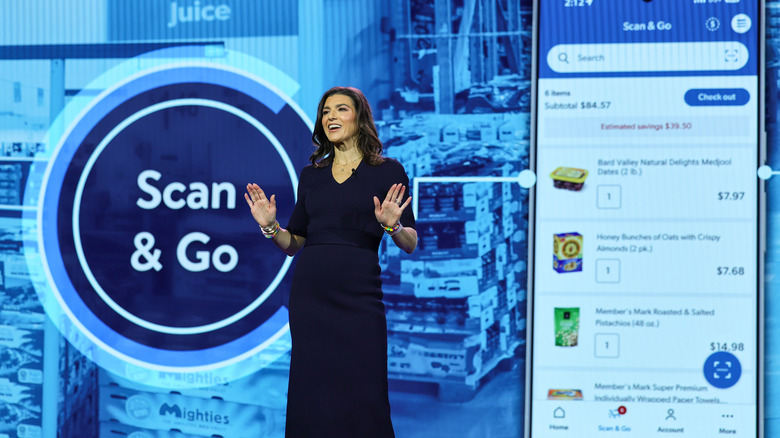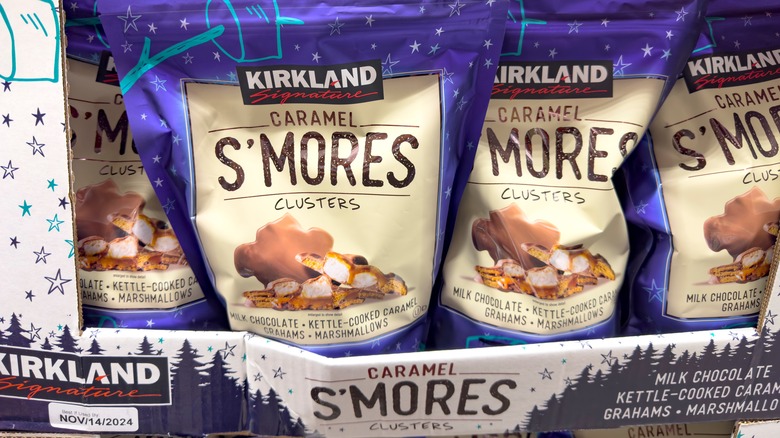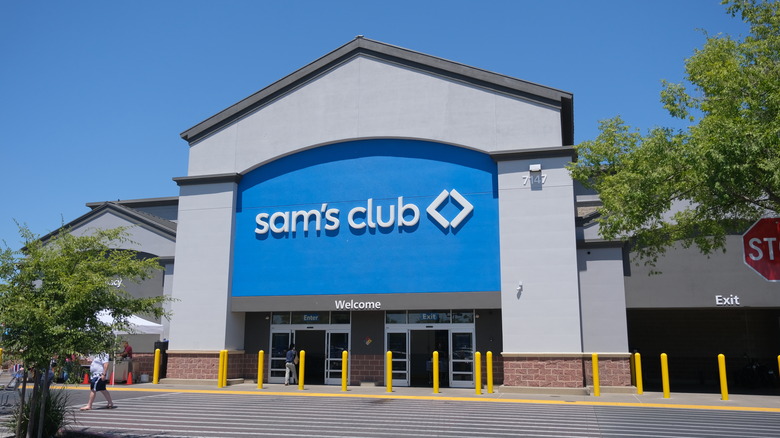Costco Vs Sam's Club: Which Membership Is A Better Value?
Grocery stores are a dime a dozen, but wholesale clubs aren't nearly as common. When it comes to retail chains that are as big in size as the scope of available products, there are two giant companies that tower over all the rest: Costco and Sam's Club. Both stores were founded in the same year, forever changing the way many Americans shop. Sam Walton, creator of the Walmart empire, opened the first Sam's Club on April 7, 1983, in Midwest City, Oklahoma. Five months later, on September 15, Jim Sinegal and Jeffrey H. Brotman opened the first Costco in Seattle, Washington. In the four decades since, the stores have opened hundreds of locations throughout the country.
Unlike other retailers that sell goods ranging from groceries to furniture, warehouse clubs are exclusively available to card-holding members. While paying to shop somewhere might seem silly, a membership at Costco or Sam's Club comes with plenty of perks. Not only are groceries and household goods often significantly cheaper than at regular stores, but there are also many special services that make a membership worthwhile. From pharmacies to tire centers, Costco and Sam's Club are as close to true one-stop shops as you can get. However, between differences in shopping experiences and store brands, these competing clubs aren't identical. If you're deciding between the two or considering switching, here's what you should know about Costco and Sam's Club to choose the membership that gives you the best bang for your buck.
The differences in membership prices and perks
Beginning with the basics, the buy-in costs to become an exclusive card-carrying member at either Costco or Sam's Club aren't the same. Sam's Club offers two tiers: the Club membership for $50 annually and the Plus membership for $110 annually. Costco cards come at a slightly steeper cost. The retailer offers two standard options: Gold Star, which costs $65 annually, and Executive for $130 annually. Business owners looking for certain tax exemptions for resale goods or to add affiliate cardholders can also pay for an exclusive Costco Business membership, which also costs $65. (Sam's Club allows members to add a limited number of affiliate cardholders to either of its tiers for a slightly reduced cost of $45.)
In terms of membership perks, the two wholesale clubs are pretty similar. For the entry-level tier, both come with an additional card for another household member, a 100% satisfaction guarantee (which applies to the membership itself and returns on any store merchandise), and access to all locations and store services, including pharmacies, optical centers, gas stations, food courts, tire centers, travel bookings, and more. The costlier Plus and Executive memberships take things up a notch. In addition to the base benefits, members receive bonus savings on services and a 2% reward on qualifying purchases. For Sam's Club, the maximum rebate is $500 a year, while Costco's is $1,250 (and the cap increases when membership prices do).
How the shopping experiences stack up
It's no secret that warehouse clubs get crowded, especially on the weekends. Between the towering aisles crammed with giant carts, a shopping trip can quickly start to feel overstimulating. While there are times you can swing by Costco to avoid crowds, a Sam's Club membership can help you avoid stepping foot into a store altogether. As it turns out, the company offers curbside pickup. Standard Club members can take advantage of this service for free on eligible orders of $50 or more, while Plus members avoid pickup fees entirely.
Sam's Club also provides another shopping convenience that allows you to skip long checkout lines altogether: Scan & Go. First introduced in 2016 before merging with the main Sam's Club app in 2018, Scan & Go grants members the ability to scan and pay for products with their phone after adding them to their cart — no stop at a cashier or self-checkout necessary. Once done, you'll receive a digital receipt to show to the employee at the door, then be on your way.
While Costco also has an app and website for online shopping, the company doesn't currently offer curbside pickup for household goods or a comparable service to Scan & Go. There's only one way to get groceries delivered from the warehouse club — and it comes at an extra cost. Costco offers same-day grocery delivery through Instacart, but items are usually marked up, so you won't benefit from the same savings.
Comparing the clubs' grocery costs
With a business model that revolves around buying in bulk, warehouse clubs are generally able to sell food for a cheaper price-per-unit than conventional supermarkets. Accordingly, you're likely to score enough savings to cover annual membership fees regardless of the club you choose. But that doesn't mean Costco and Sam's Club have the same prices.
In October 2023, the AARP conducted a cart-by-cart comparison of certain groceries purchased at locations of both giant retailers in Long Island, New York. When all was said and totaled up, Sam's Club delivered on affordability. For instance, the Walmart-owned warehouse's marinara sauce was nearly $3 cheaper per pound than at Costco; ketchup, jelly, milk, bell peppers, and several other staples were also a better deal there. The two clubs sold some items at the same price, such as chocolate chip cookies and rotisserie chickens. However, Costco outshone Sam's Club in regard to several other foods. Bulk rice, for instance, only cost 5 cents per pound at Costco, but 70 cents at Sam's Club. Ground beef, baked beans, tuna, and sliced bread were also marginally cheaper at Costco.
If your goal is to save the most money on groceries possible, Sam's Club is probably the better membership choice. But if you're not as concerned about pinching pennies and are shopping with quality in mind, Costco's selection of organic foods and premium goods — especially products sold under the company's store brand — may be worth paying a little extra for.
The rival store brands: Kirkland Signature vs Member's Mark
Private label brands are standard at most grocery stores. Some chains, like Trader Joe's, sell almost no name brand products whatsoever. Costco and Sam's Club aren't quite as extreme about stocking store-specific merchandise — Kirkland Signature and Member's Mark, respectively — but both companies have still seriously invested in them.
While there are failed in-house brands that preceded Kirkland Signature, which hit shelves in 1995, Costco's star store brand is extremely popular. In fact, it's the biggest-selling consumer packaged goods' brand in the country, per CNN. Some Kirkland products, such as the Kirkland Signature beef franks, are made by Costco to keep quality high and prices low. But many other products are made by massive name brands. The retailer's canned tuna is supplied by Bumble Bee, for instance, and Costco also has partnerships with Jelly Belly and Ocean Spray. The store carries certain hard-to-come-by goods, too, like authentic Italian Parmigiano Reggiano cheese and rare (and often heavily discounted) alcohol.
Member's Mark isn't quite as popular as Kirkland Signature but it's still an affordable, quality alternative. In an effort to achieve similar store brand success as Costco, the Walmart-owned club has been giving Member's Mark a makeover, launching, tweaking, and upgrading over 1,200 products since 2020 (via CNBC). And while the company isn't as open as Costco in terms of partnerships, The Motley Fool has reported on rumors of products made by big brands including Purina, Tyson, and Walmart's Great Value.
Location may be a big consideration
Regardless of all the services and savings, location might be the make-or-break factor in terms of whether a Sam's Club or Costco membership is the better value. After all, if you live over an hour from one retailer, but 20 minutes from the other, you'll likely save more money (and time) by simply choosing the warehouse club that's closest to you. While Costco does have the most locations between the two, the distribution of both stores across states and parts of the country might help sway your decision.
True to where each wholesale club was originally founded, Costco tends to have more locations in the western U.S. and some states in the northeast, while Sam's Club dominates the midwestern and southern U.S. Of course, that doesn't mean you won't be able to find either retailer in other regions. Costcos can be found in D.C. and 47 states — all of them except for Wyoming, West Virginia, and Rhode Island — with the greatest concentration of stores in California (139).
On the other hand, Sam's Club has warehouses in 44 states, excluding Oregon, Alaska, Massachusetts, Rhode Island, Vermont, and Washington, Costco's home turf). Naturally, residents of Wyoming or West Virginia will be best off shopping at Sam's Club, which has two and five locations in these states respectively. Ultimately, though, you'll want to scope out a map before making a final choice between Sam's Club and Costco memberships.
